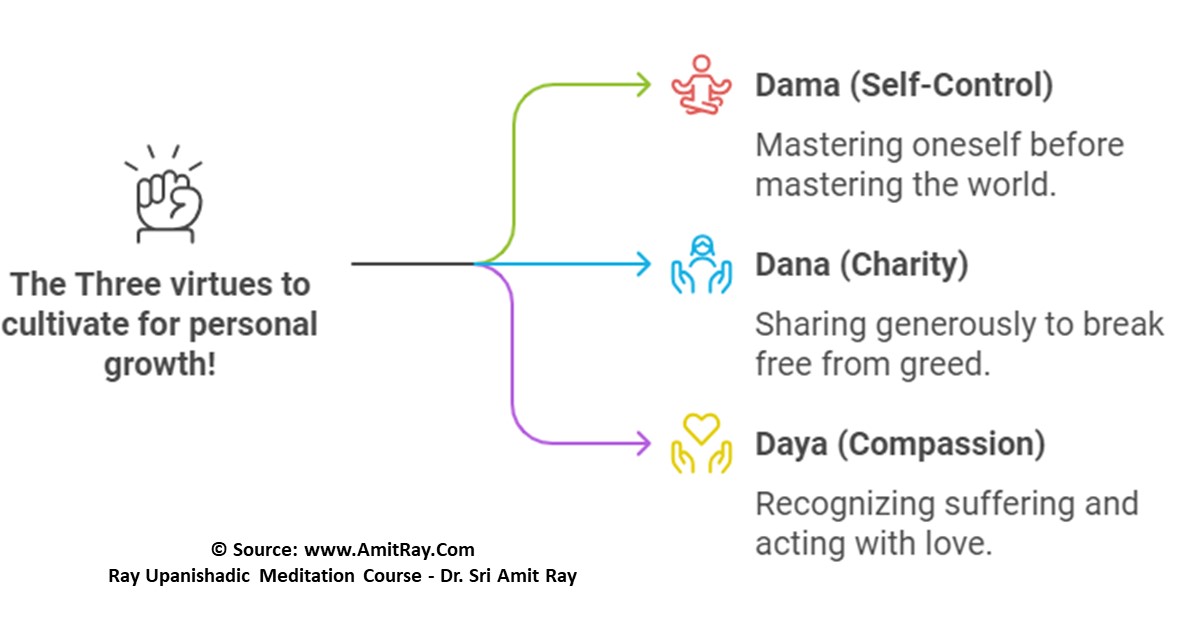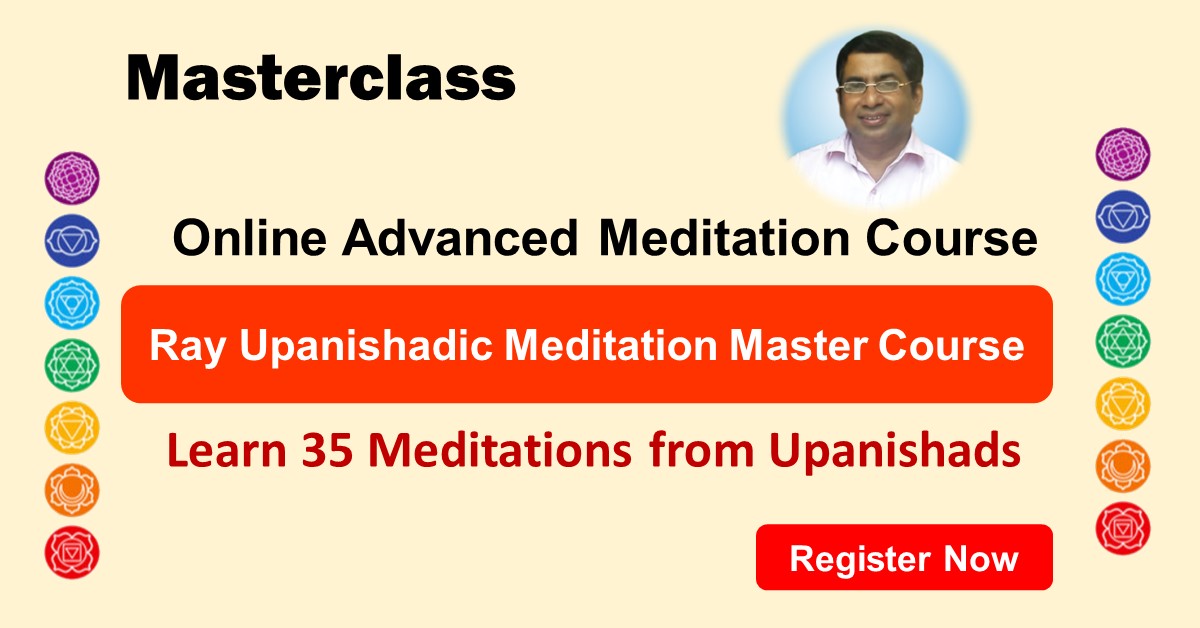The Upanishads, ancient philosophical scriptures forming the core of Indian spiritual thought, have been guiding seekers of truth for millennia. Among them, the Brihadaranyaka Upanishad stands as one of the oldest and most profound. It addresses fundamental questions about the nature of reality, the self, and ethics. One of the most celebrated sections of this Upanishad is the teaching commonly referred to as the “Da Da Da” or the Triple ‘Da’ teaching, found in Brihadaranyaka Upanishad 5.2.
Discover the profound teachings of “Da Da Da”: The Timeless Wisdom of the Upanishads. Explore the ancient art of living and the spiritual enlightenment in modern world.
This simple, yet deeply significant, mantra encapsulates three essential ethical principles: self-control (dama), charity (dāna), and compassion (dayā). In this article, we will explore the deeper meaning of “Da Da Da” and its relevance for modern life.

By understanding Da Da Da as Tripada Yajna, you can see that it is not just a mantra to be recited but a guiding principle for living a purposeful, ethically grounded, and spiritually fulfilling life.
Through the practice of self-control, charity, and compassion, you create a ripple effect that spreads peace, balance, and unity across the individual, societal, and cosmic levels.
The Context of “Da Da Da”
The “Da Da Da” teaching occurs in the fifth chapter of the Brihadaranyaka Upanishad. This section, called the Prajapati Brahmana, is framed around a conversation between the supreme creator deity, Prajapati, and three groups of beings: the Devas (gods), Manushyas (humans), and Asuras (demons). Each group approaches Prajapati seeking guidance, and Prajapati imparts the same syllable, “Da,” to each group. Despite receiving the same sound, each group interprets the syllable differently based on their own nature and needs.
The brilliance of this teaching lies in its simplicity and universality. Though the syllable “Da” is the same for all, its meaning shifts according to the disposition of the listener, reminding us that ethical guidance must resonate with the individual’s context and life circumstances. Let’s explore how each group interprets the syllable “Da” and the significance of the virtues they derive from it.
1. The Gods (Devas): “Dāmyata” – Be Self-Controlled
The Devas, celestial beings often associated with power, prosperity, and immortality, approach Prajapati first. The Devas, despite their divine nature, are prone to overindulgence and excess, given their abundance of wealth and pleasure. To them, Prajapati utters the syllable “Da”, and the Devas interpret it as “Dāmyata”, meaning self-control.
Self-Control (Dama): The Virtue of Restraint
For the Devas, who have access to endless pleasures and powers, the greatest challenge is maintaining control over their desires. Dama (self-control) is thus the appropriate teaching for them. This teaching urges them to restrain their senses and desires, to not let their powers and indulgences cloud their judgment or lead them astray.
Self-control is an essential virtue not only for the Devas but for all of us. In our daily lives, whether it be material pleasures, emotional impulses, or mental distractions, we often struggle with excess. Practicing dama allows us to gain mastery over our senses, making us less vulnerable to temptations and more focused on our higher purpose.
In today’s fast-paced world of instant gratification—where temptations surround us in the form of technology, consumerism, and media—self-control has never been more critical. The wisdom of “Dāmyata” reminds us to pause, reflect, and exercise restraint, ensuring that we are not swept away by fleeting pleasures.
2. The Humans (Manushyas): “Datta” – Be Charitable
Next, the humans (Manushyas) approach Prajapati for guidance. Human beings are unique in the sense that they dwell in the realm of maya (illusion), constantly caught between the material and the spiritual worlds. Humans often struggle with greed, attachment, and the tendency to hoard possessions, thinking they will bring lasting happiness. To the humans, Prajapati gives the same syllable “Da,” which they interpret as “Datta”, meaning give or practice charity.
Charity (Dāna): The Virtue of Generosity
For humans, dāna (charity) becomes the essential teaching. It is a call to give freely of one’s resources, time, and compassion to others. Humans are constantly accumulating wealth and material possessions, but true fulfillment does not come from hoarding; it comes from sharing and giving. The practice of charity breaks the chains of attachment and greed, fostering a sense of community and interconnectedness.
Dāna is more than just giving money or possessions; it is an attitude of generosity that extends to every aspect of life—kindness in words, actions, and thoughts. In giving, one experiences the joy of selflessness and transcends the ego, which is the root cause of human suffering.
In a world that often encourages accumulation and consumerism, Datta challenges us to rethink our relationship with wealth and possessions. It invites us to share what we have, not just for the benefit of others but for our own spiritual growth. Acts of kindness, whether large or small, create a ripple effect that enhances the collective well-being of society.
3. The Demons (Asuras): “Dayadhvam” – Be Compassionate
Lastly, the Asuras, or demons, approach Prajapati. The Asuras, often depicted as beings full of anger, violence, and destructive tendencies, are asked to interpret the syllable “Da.” They hear it as “Dayadhvam”, meaning be compassionate.
Compassion (Dayā): The Virtue of Kindness
For the Asuras, who are prone to cruelty and harshness, the teaching of dayā (compassion) is the most fitting. Compassion softens the heart and helps one see the suffering of others. It counters the Asuras’ natural inclination toward violence and aggression. By practicing compassion, they are reminded of the unity of all beings and are encouraged to treat others with empathy and kindness.
Compassion is a transformative virtue. It not only benefits those who receive it but also uplifts those who give it. By fostering compassion, we break down the barriers of anger, hatred, and enmity that often plague our lives and relationships.
In today’s world, where conflicts, divisions, and misunderstandings often dominate, the message of Dayadhvam is incredibly pertinent. Compassion helps heal wounds, bridge divides, and create a more harmonious society. It calls us to step beyond our own perspectives and to recognize the suffering of others, offering kindness and understanding instead of judgment or hostility.
The Symbolism of Thunder: Universal Divine Voice
The “Da Da Da” teaching is said to echo through the voice of thunder, representing the divine voice. The thunder metaphor is significant because thunder is a natural phenomenon that is heard by all beings—whether gods, humans, or demons. Just as thunder is universal and impartial, so too is the teaching of Dāmyata, Datta, and Dayadhvam. These three virtues—self-control, charity, and compassion—are applicable to all beings, regardless of their nature.
“तदेत देवैषा दैवी वागनुवदति स्तनयित्नुर् द द द इति—दाम्यत दत्त दयध्वमिति;
तदेतत्त्रयं शिक्शेत्—दमं दानं दयामिति ॥ ३ ॥”
tadeta devaiṣā daivī vāganu-vadati stanayitnur da da da iti—dāmyata datta dayadhvamiti;
tadetattrayaṃ śikśet—damaṃ dānaṃ dayāmiti ॥ BU: 5.2.3 ॥
Translation:
1. तदेतदेवैषा दैवी वागनुवदति स्तनयित्नुर् द द द इति—
- “Then, the divine voice (Vāk) speaks, ‘Da Da Da,’ the divine sound of a compassionate and motherly nurturing voice.”
- This refers to the divine speech or Vāk (the eternal principle of sound and communication), where the nurturing or maternal voice guides us through the practice of the three essential principles. The sound of “Da Da Da” represents a sacred teaching coming directly from the divine, akin to the wisdom imparted by a nurturing mother.
2. दाम्यत दत्त दयध्वमिति;
“It says: ‘Dāmyata’ (Be in Control), ‘Dattā’ (Give), ‘Dayadhvam’ (Be Compassionate).”
The verse explains the three aspects:
- Dāmyata (दाम्यत) – Self-Control: The mastery over one’s senses and impulses. It means the control of desires and the discipline of the mind.
- Dattā (दत्त) – Give: The practice of charity or selfless giving. It signifies generosity, offering what we possess to others for their well-being.
- Dayadhvam (दयध्वम्) – Be Compassionate: Cultivating empathy and compassion towards all living beings. It urges one to understand and alleviate the suffering of others.
3. तदेतत्त्रयं शिक्शेत्—दमं दानं दयामिति ॥
- “Thus, one should learn these three: Dama (self-control), Dāna (charity), and Dayā (compassion).”
- The verse concludes by instructing the practitioner to learn and embody these three virtues: self-control, charity, and compassion. These virtues form the foundation of spiritual progress and harmonious living in accordance with divine principles.
Thunder also symbolizes the power and authority of divine instruction. It is a reminder that these ethical principles are not merely suggestions; they are cosmic laws that guide the well-being and harmony of the universe.

The Three Ethical Pillars: A Universal Code of Conduct
The brilliance of the “Da Da Da” teaching is its universality. Each group—Devas, Manushyas, and Asuras—receives a lesson tailored to their specific nature, yet these lessons are also relevant for all beings. Whether one is a celestial being, a human, or a being inclined toward negativity, the teachings of self-control, charity, and compassion form the foundation of ethical living.
These three virtues—Dāmyata, Datta, and Dayadhvam—can be seen as a universal code of conduct:
- Dama (Self-Control): The practice of restraining our desires, impulses, and emotions. It reminds us to master ourselves before trying to master the world.
- Dana (Charity): The practice of giving generously without attachment. It reminds us to share what we have with others and to break free from the clutches of greed and materialism.
- Daya (Compassion): The practice of empathy and kindness. It reminds us to recognize the suffering of others and to act with love and care.
Together, these three virtues form the ethical backbone of human existence. They guide individuals to lead lives that are morally sound, spiritually fulfilling, and socially responsible.
Modern-Day Relevance of “Da Da Da”
In a contemporary world marked by individualism, consumerism, and conflict, the teachings of “Da Da Da” are more relevant than ever. We live in a time when self-restraint is often overshadowed by the desire for instant gratification, when accumulation of wealth is prioritized over the well-being of others, and when compassion is often neglected in favor of competition and aggression.
Self-Control in an Age of Overstimulation
In today’s world, we are constantly bombarded with stimuli—social media, advertising, entertainment, and consumerism all demand our attention and encourage indulgence. Practicing Dāmyata (self-control) helps us regain inner peace and mental clarity, allowing us to navigate the complexities of modern life with greater wisdom and focus.
Charity in a World of Inequality
The gap between the rich and the poor continues to widen in today’s globalized world. Practicing Datta (charity) reminds us of our social responsibility and the importance of sharing our resources with those less fortunate. In a world where wealth is concentrated in the hands of a few, acts of charity can help create a more just and equitable society.
Compassion in a Divided World
In an era of polarization and conflict, practicing Dayadhvam (compassion) is essential for fostering understanding and harmony. Compassion can break down the barriers of hatred, prejudice, and violence, creating a more peaceful and inclusive world.
Tripada Yajna as a Holistic Approach to Spirituality
The beauty of Da Da Da as Tripada Yajna lies in its holistic approach to life. It teaches that true spirituality is not just about personal enlightenment but about how we interact with the divine, the past (ancestors), and the present (living beings) around us. Each aspect of Da Da Da calls for the individual to transcend their selfish desires and to think beyond personal gratification.
- Self-Control is the foundation of spiritual practice. It is the ability to master the mind and senses, allowing one to act in harmony with cosmic laws. Through self-control, we align ourselves with the divine and contribute to the universal order.
- Charity is the act of giving, an offering of ourselves and our resources to the welfare of others. It is a recognition that our material possessions are not truly ours but are entrusted to us as caretakers, meant to be shared with the world.
- Compassion is the final aspect that ties everything together, as it reflects the interconnectedness of all beings. By acting with compassion, we honor not only the divine and our ancestors but also the suffering of others, and we take responsibility for the well-being of the world.
Tripada Yajna and Cosmic Harmony
The Tripada Yajna (responsibility, respect, and compassion) is designed to create balance between the spiritual, the ancestral, and the natural worlds. It is a way of participating in the divine rhythm of the universe and recognizing that our actions, both in the material and spiritual worlds, contribute to the cosmic order. Each aspect of the Yajna represents a crucial part of this cycle:
- Divine respect represent the giving of ourselves to the greater good and alignment with cosmic forces.
- Ancestral offerings recognize that our existence is a Genetic Linkage in a long chain of human experience, and our actions today shape the future. Aligning past, present, and future in divine way through offerings.
- Service to living beings acknowledges the interconnectedness of all life on Earth and promotes sustainability and harmony with nature.
In this sense, the Tripada Yajna becomes a symbolic and practical expression of how to live a balanced, dharma-centered life in alignment with both the cosmos and our environment. It is a guiding principle for a life of responsibility, respect, and compassion.
Conclusion
The “Da Da Da” teaching from the Brihadaranyaka Upanishad offers timeless wisdom that continues to resonate across cultures and epochs. Its message of self-control, charity, and compassion is as relevant today as it was in ancient times. By embodying these virtues in our daily lives, we can cultivate inner peace, foster social harmony, and contribute to the well-being of all.
In the simplicity of “Da Da Da,” we find profound ethical guidance for living a life of purpose, balance, and compassion. Let us take this ancient wisdom to heart and apply it to our modern world, creating a future rooted in the principles of restraint, generosity, and love.
FAQ
What is the significance of the “da da da” phrase in the Brihadaranyaka Upanishad?
The “da da da” phrase is a deep and symbolic expression. It captures the essence of the Brihadaranyaka Upanishad’s wisdom. It guides seekers to understand reality’s non-dual nature. It teaches the art of living in this world with: self-control, charity, and compassion.
What are the key concepts explored in the Brihadaranyaka Upanishad?
The Brihadaranyaka Upanishad explores key Vedanta philosophy concepts. It talks about Brahman, the ultimate reality, and Atman, the individual soul. It also discusses the path to self-realization and spiritual enlightenment.
How can the teachings of the Brihadaranyaka Upanishad be applied to modern life?
The Upanishad’s wisdom can be applied to everyday life. It helps find meaning, purpose, and a deeper connection to the universe. Its teachings charity, self-control, compassion, and self-realization of the non-dual consciousness helps through life’s complexities.
What is the significance of the Upanishads in the yoga spiritual and intellectual tradition?
The Upanishads, including the Brihadaranyaka Upanishad, are key texts in Hinduism, and yoga philosophy. They offer deep insights and wisdom. They guide seekers to understand existence and the path to enlightenment.
How does the Brihadaranyaka Upanishad contribute to the Vedanta philosophy?
The Brihadaranyaka Upanishad is a core text of Vedanta. It teaches the unity of the self (Atman) and ultimate reality (Brahman). Its teachings on reality’s non-dual nature and self-realization are central to Vedanta.

